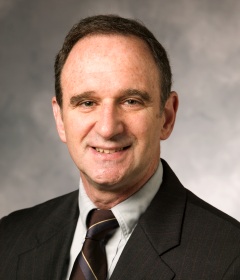Professor Martin E. Hellman
Martin E. Hellman, Ph.D., Fellow of the IEEE, Member, National Academy of Engineering (USA), is Professor Emeritus of Electrical Engineering, Stanford University and Founder of Defusing the Nuclear Threat.
Martin was at IBM’s Watson Research Center from 1968 to 1969 and an Assistant Professor of EE at MIT from 1969 to 1971. Returning to Stanford in 1971, he served on the regular faculty until becoming Professor Emeritus in 1996.
He has authored over seventy technical papers, six US patents, and a number of foreign equivalents. His patents include Cryptographic apparatus and method, Public key cryptographic apparatus and method, Exponentiation cryptographic apparatus and method, Method and apparatus for use in public-key data encryption system, Software distribution system, and Authentication using random challenges.
Martin is best known for his invention, with Whitfield Diffie and Ralph Merkle, of public key cryptography. In addition to many other uses, this technology forms the basis for secure transactions on the Internet. He has also been a long-time contributor to the computer privacy debate, starting with the issue of DES key size in 1975 and culminating with service (1994 to 1996) on the National Research Council’s Committee to Study National Cryptographic Policy, whose main recommendations have since been implemented.
Martin authored Risk Analysis of Nuclear Deterrence, An Overview of Public Key Cryptography, Resist Not Evil, A Cryptanalytic Time-Memory Tradeoff, and Learning with Finite Memory, and coauthored Time-Memory-Processor Trade-offs, The Largest Super-Increasing Subset of a Random Set, On Secret Sharing Systems, Convolutional Encoding for Wyner’s Wiretap Channel, Hiding Information and Signatures in Trap Door Knapsacks, The Gaussian Wire-Tap Channel, An Improved Algorithm for Computing Logarithms Over GF(p) and its Cryptographic Significance, and Exhaustive Cryptanalysis of the NBS Data Encryption Standard. Read the full list of his publications!
Martin also has a deep interest in the ethics of technological development. With Professor Anatoly Gromyko of Moscow, he coedited Breakthrough: Emerging New Thinking, a book published simultaneously in Russian and English in 1987 during the rapid change in Soviet-American relations. His current project in this area is Defusing the Nuclear Threat, has been endorsed by a number of prominent individuals including two Nobel Laureates.
He also worked to develop an environment within the university within which students of diverse backgrounds could function to the best of their ability. This work was recognized by four teaching awards, including three from minority student organizations.
Martin was elected a Fellow of the IEEE “for contributions to cryptography” in 1980. He received the 1984 IEEE Centennial Medal, the 1994 Electronic Frontier Foundation Pioneer Award, and the 1996 National Computer Systems Security Award. In 1998, he became an International Engineering Consortium Fellow. In 2000, he received the Marconi International Fellow Award. He was elected to the National Academy of Engineering “for contributions to the theory and practice of cryptography” in 2002. He was elected a Fellow of the IACR (International Association for Cryptologic Research) “for the invention of public-key cryptography and for pioneering open research in cryptology” in 2006. Read the full list of his honors and awards.
Martin has been involved with a number of high-tech startups over the last twenty-five years, serving variously as a founder, advisor, and investor. In his spare time, he enjoys people, soaring, speed skating, and hiking.
Martin earned his B.E. from New York University in 1966, and his M.S. and Ph.D. from Stanford University in 1967 and 1969, all in Electrical Engineering. Learn about his work on cryptography, past work on war and peace, current work on war and peace, work on diversity, and opinions.
Read the transcript of his Charles Babbage Institute interview. Read Risk Analysis Finds Nuclear Deterrence Wanting and Technology Pioneers Dr. Vinton G. Cerf and Dr. Martin E. Hellman Join VeriSign Scientific Advisory Board.
